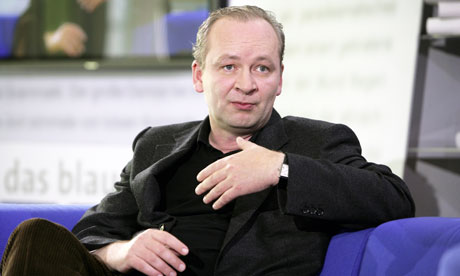
Ferdinand von Schirach The Collini Case
A venerable man of German industry is brutally murdered in a hotel room. The killer hands himself in to police but refuses to explain his crime. To the press and the courts it looks like the motiveless work of a psychopath – until an inexperienced defence lawyer Caspar Leinen discovers documents about the dead man's secret past in Nazi-occupied Italy.
Lawyer Ferdinand von Schirach – a lawyer whose grandfather Baldur von Schirach led the Hitler Youth was reich youth leader of the Nazi party – established himself as an author with two collections of short stories in 2009 and 2010, Guilt and Crime. The Collini Case has not only been a bestseller since it was published in 2011, it has also ignited a debate about a 1968 law, the introductory act to administrative offences, that meant many accused of war crimes during the Nazi era could only be tried for manslaughter, not murder. In February this year, the justice ministry commissioned an investigation into criminal law changes of the 1950s and 1960s.
Germany's new role at the centre of Europe's political stage has led to soul searching at home and abroad: is the new generation done with atoning for the sins of its grandparents, finished with wartime guilt? Judging by the success of Von Schirach's novel, the process of historical self-examination is far from finished. In many ways The Collini Case is a step back from the last bestseller by a lawyer-novelist, Bernhard Schlink's The Reader, published in 1995, which broke many taboos by portraying a Nazi criminal in a partly sympathetic light. Von Schirach's book stays resolutely on the victims' side.
Manfred Spitzer Digital Dementia
The famous neuroscientist argues that our growing reliance on search engines, satnavs and Wikipedia means we are failing to give our grey matter the kind of workout it needs. The unlikely heroes of Spitzer's study turn out to be a familiar species: London black-cab drivers. Thanks to a study of a taxi driver who had memorised "the knowledge" of the capital's streets, he writes, "we know that the brain is not only the most complicated, but the most dynamic organ in our body. It grows or shrinks according to usage."
Wolfgang Herrndorf Tschick
Praised by critics as a "German Huckleberry Finn", Herrndorf's Spiegel bestseller tells the story of a teenager from a wealthy but dysfunctional family and his Russian-German classmate, who one summer holiday embark on a road trip around the former GDR in a stolen Lada. It's also an exploration of the real East Germany as the west still doesn't know it.
"The world is bad, and people are bad too. That's what my parents told me, my teachers told me and television tells me. But the strange thing was that on our journey Tschick and I almost exclusively met those few people who weren't bad at all." A few months before the novel appeared in 2010, 46-year-old Herrndorf was diagnosed with a rare and aggressive form of cancer. He has been chronicling his daily struggles with the illness in an online journalsince.
Ann-Marlene Henning and Tina Bremer-Olszewski Make Love
A Joy of Sex for a generation growing up with internet porn, combining infographics, arthouse photography and practical advice. "The abundance of sex creates a false impression of familiarity: we've seen it all, we've done it all," the authors write in the introduction. "But the problem is: what the media presents as sexuality has little to do with the real thing." As a remedy, Henning and Bremer-Olszewski give us surprising facts (did you know that a full-on snog engages as many as 17 muscles?), a guide to rude words from around the world and a thorough deconstruction of modern porn cliches. Shifted more than 60,000 copies in the first 10 weeks after publication.
Rolf Dobelli: The Art of Clear Thinking
In 52 short chapters Dobelli tries to put a finger on why CEOs, economists or just the average shopper makes mistakes: because we sometimes believe in stories rather than facts, because we fail to draw lessons from our own failures or because we think that an item chosen from a large selection is more valuable than one from a small one. Mixing management-speak and real science, Dobelli's bestseller (300,000 sales to date) follows in the wake of Naseem Nicholas Taleb's Black Swan and Daniel Kahnemann's Thinking Fast and Slow.
Thilo Sarrazin Europe Doesn't Need the Euro
"If the euro fails, then Europe failed," Angela Merkel said in September last year, but former Bundesbank member Thilo Sarrazin doesn't buy it. Ditching the deutschmark, he says, was driven by "magical thinking", and those Germans now calling for eurobonds are "driven by that very German reflex, which says that we have only repented for the Holocaust and world war once all our belongings, including our money, has been handed into European ownership".
Europe Doesn't Need the Euro has sold more than 200,000 copies, but critics have taken issues with some of Sarrazin's conclusions. The Süddeutsche Zeitung newspaper asked why Sarrazin doesn't spell out what would have happened if Germany had stuck with the deutschmark. "Perhaps because a strong D-mark would have made German wares increasingly expensive?" As with his polemical 2010 book on Germany's migrant minorities, Germany Abolishes Itself, Sarrazin is quick to point the finger at potential problems but much slower to come up with constructive solutions.

